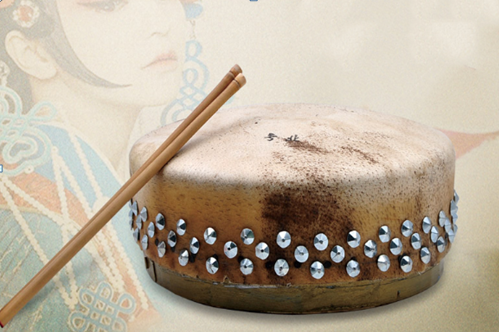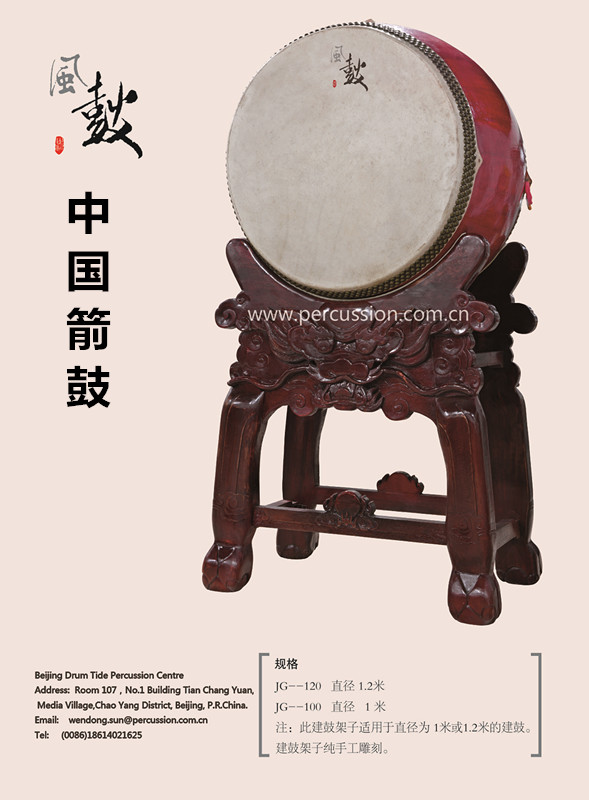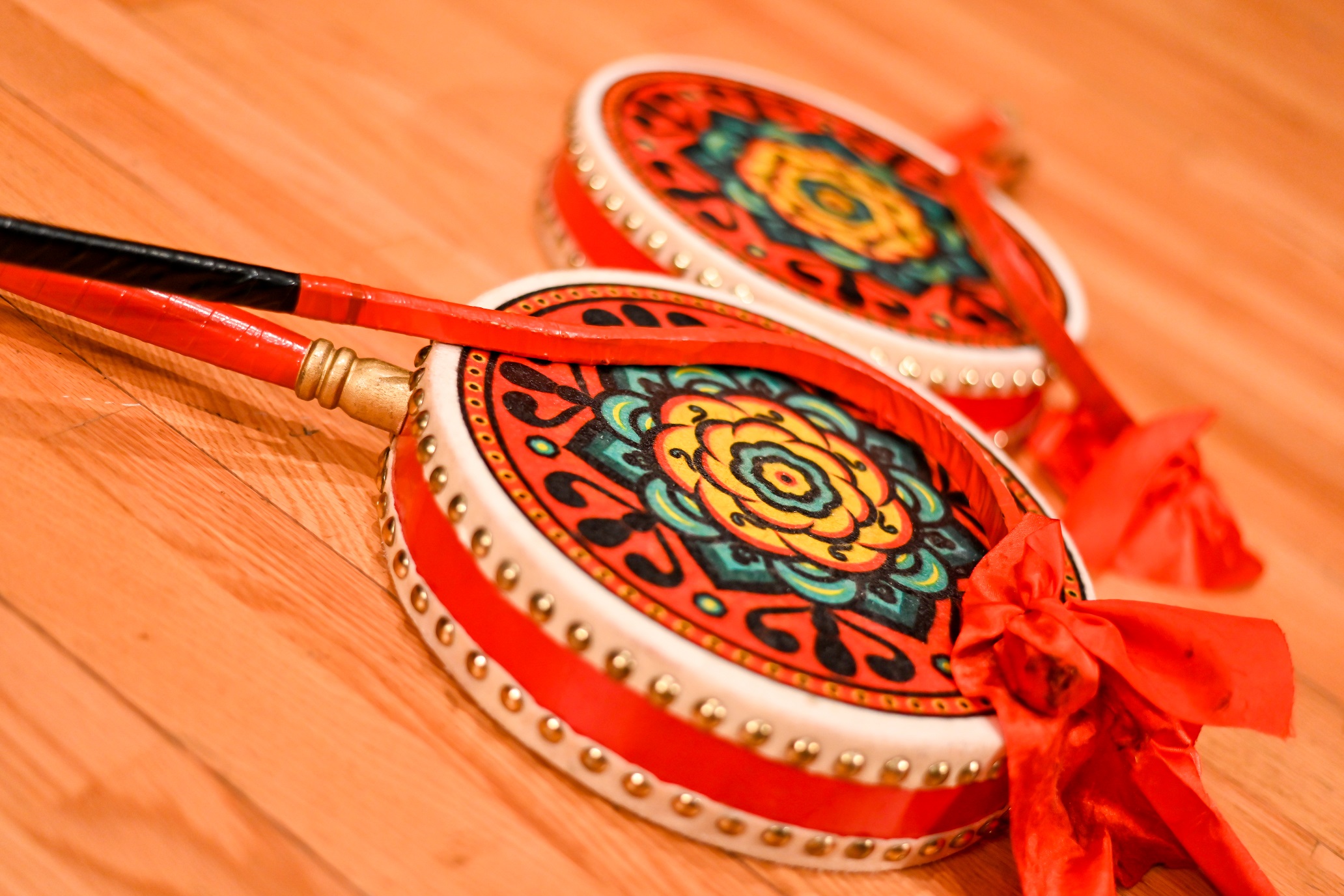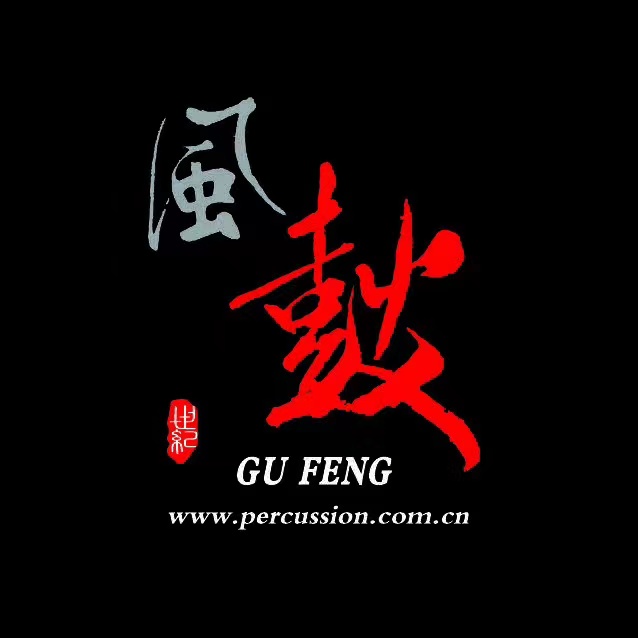板鼓BanGu
槌击膜鸣乐器,因常与拍板由一人兼奏而得名,并有“单皮”(一面蒙皮)和“班鼓”(过去戏班专用)之称,最早出现于唐朝,随着明清戏曲艺术的发展,广泛用于昆曲、京剧等地方戏曲伴奏中在,是中国戏曲乐队中的指挥乐器。
鼓身用优质硬木料制作,由5块较厚木板拼合而成,鼓身直径25厘米,中间振动发音的鼓面仅有5~10厘米,鼓膛呈八字形,鼓边高9.5厘米。鼓皮用牛皮,绷紧于整个板面直到鼓的底边。蒙皮的鼓膛部分,是敲击发音部位。板鼓发音的高低,取决于鼓膛的大小和蒙皮的松紧。为保持鼓皮的张力,所钉鼓钉较多,并在底部箍以铁圈。
Drumsticks hit the "membrane"
sounding instrument, which is named because it is often played with clappers by
one person. It is also known as "single skin" (with one skin covered)
and "class drum" (used exclusively by troupes in the past). It first
appeared in the Tang Dynasty, and with the development of opera art in Ming and
Qing Dynasties, it was widely used in the accompaniment of Kunqu opera, Beijing
opera and other local operas. It is the conductor instrument in China opera
bands.
The drum body is made of high-quality hard
wood, which is made up of five thick wooden boards. The diameter of the drum
body is 25 cm, the middle vibrating surface is only 5 ~ 10 cm, in the bottom of
drum is the shape of an octagon , and the drum edge is 9.5 cm high. The
skin of the drum is made of cowhide, which is stretched on the whole panel
until the bottom edge of the drum. The center part of the drum surface is the
percussion pronunciation part. The pronunciation of the drum depends on the
size of the drum cavity and the tightness of the drum skin. In order to keep
the tension of the drum skin, more drum nails are nailed, and an iron ring is
tied at the bottom.
建议售价:¥1500.00
小堂鼓Xiao Tanggu
是汉族传统棰击膜鸣乐器之一,也是民乐中使用最频繁的打击与其之一。以木为框,两面蒙牛皮。
演奏时,将鼓放在木架上,用槌敲击。堂鼓鼓面较大,从鼓心到鼓边可以发出不同的音高,音色都不一样,一般是鼓心的音比较低,鼓边的音比较高。经由通过敲击鼓边、鼓心和控制敲击的力量,可以获得大幅度的音量和音色对比。
It is one of the traditional percussion
instruments of Han nationality, and it is also one of the most frequently used
percussion instruments in folk music. Wooden frame, cowhide on both sides.
To play, the drum is placed on a wooden stand
and struck with mallets. The drum has a large surface and can produce different
pitches and tones from the centre to the sides of the drum. Usually the tone is
lower in the centre of the drum and higher in the sides.
建议售价:¥3800.00
花盆鼓Hua
Pengu(Flowerpot drum)
鼓身呈花盆形状,鼓框用自然风干的优质木料制作,两面蒙以牛皮。以定制古铜色匏钉固定,鼓身上下均用朱漆上色,上下鼓面大小不一,上口较大,声音洪亮,下口较小,使得上口的声音更加震撼。
花盆鼓,因造型优美,专用于剧团演出,这种鼓的演奏技巧和堂鼓大致相同,用双木槌敲击。音色低沉、雄厚,比堂鼓柔和,并可根据不同的击打位置与演奏手法奏出不同的音调。
The drum is shaped like a flowerpot. The drum
frame is made of high-quality wood that is naturally dried, and its two sides
are covered with cowhide. It is fixed with custom bronze nails, and the upper
and lower parts of the drum are painted with vermilion paint. The upper and
lower drumheads are different in size, and the upper drumhead is big, loud and
the lower is small, which makes the upper voice more shocking.
Hua Pengu, because of its beautiful shape, is specially used for troupe performances. The playing skill of this drum is roughly the same as that of the Tang drum, and it is struck with double mallets. The timbre is deep and strong, softer than the Tang drum, and different tones can be played according to different hitting positions and playing techniques.
建议售价:¥9800.00
大鼓Da Gu
大鼓是汉、藏等族棰击膜鸣乐器,流行于全国各地。古往今来,大鼓一直成为各族人民喜爱的民间乐器。因流行地域、使用对象的不同而形制也有区别。多用于报时、祭祀、宫廷仪仗、军事、宗教、器乐、舞蹈、戏曲、婚丧、节日和民间娱乐等场合中。
Drum is a percussion instrument of Han,
Tibetan and other ethnic groups, which is popular all over the country.
Throughout the ages, the drum has been a favorite folk instrument of all ethnic
groups. Because of the different popular areas and users, their shapes are also
different. It is used in many occasions such as time-telling, sacrifice, court
ceremonial, military, religious, instrumental music, dance, drama, weddings and
funerals, festivals and folk entertainment.
建议售价:60大鼓¥22800.00(60 cm in diameter)
80大鼓 ¥25000.00(80 cm in diameter)
扁鼓Bian Gu
是民族打击乐中分类最多,使用地区最广的鼓,多出现在蒙古、藏、朝鲜、满、纳西、彝、苗、汉等地。旧时用于宗教音乐和民间婚礼,现用于民间乐器合奏、舞蹈、灯会、杂技团、和群众性锣鼓队中。
扁鼓鼓身呈扁圆形,鼓框木制,两面蒙羊皮或牛皮,用绳索绷紧。鼓面直径37~45厘米。节奏变化较多,与堂鼓相比,声音较低,但很响亮。
It’s the most classified and widely used drum
in the national percussion music, which mostly appears in Mongolia, Tibet,
Korea, Manchu, Naxi, Yi, Miao and Han. Formerly used for religious music and
folk weddings, it is now used in folk musical instrument ensembles, dances,
lantern shows, acrobatic troupes, and mass gongs and drums.
It is flat and round, with wooden frame, sheepskin or cowhide on both sides, and it is tightened with ropes. The diameter of drumhead is 37 ~ 45cm. There are many changes in rhythm. Compared with the TangGu, the sound is low, but very loud.
建议售价:¥4000.00
建鼓Jian Gu
建,即“立”的意思。建鼓历史悠久,三千年前的商代至西周之际已有此鼓,战国时代已广泛应用。是民族打击乐中历史最悠久的鼓。
建鼓的鼓身长而圆,鼓体较大,古时以一立柱贯串鼓身而立,如今置于鼓架上,演奏时站立,用两棰敲击一面。音量洪大,传播甚远。我国今日流传的许多大鼓,都起源于建鼓。
“建(Jian)”, which means
"stand". Jian Gu has a long history. It was built from the Shang
Dynasty to the Western Zhou Dynasty 3,000 years ago, and was widely used in the
Warring States Period. It is the oldest drum in national percussion.
Jian Gu has a long, round and large drum
body. In ancient times, it stood with a column running through the drum body.
Now it is placed on the drum frame. When playing, people keep standing and hits
one side with two pestles. The volume is loud and it spreads far. Many drums
circulating in China today originated from the construction of drums.
建议售价:¥43000.00
排鼓Pai Gu
民族打击乐器中的新品种。出现在上世纪六十年代初,根据民间常用的中型堂鼓和腰鼓改革制作而成。
排鼓由五个大小不同、发音有别的鼓组成一套。排鼓发音激烈、跳荡,高音坚实有力,中、重低音宽厚洪亮,尤善于表现热烈欢腾的情绪。
New varieties of national percussion
instruments. It appeared in the early 1960s, and was made according to the
reform of medium-sized TangGu and Waist Drum commonly used by the people.
The drum is consist of five drums with
different sizes and different pronunciations. The drums are fierce and
bouncing, the treble is firm and powerful, the middle and heavy bass are
generous and loud, and they are especially good at expressing warm and jubilant
emotions.
建议售价:¥35000.00
以上为部分品牌产品展示 ,具体请关注图中二维码
The following are some of the brand products show ,
please scan the QR code in the picture









